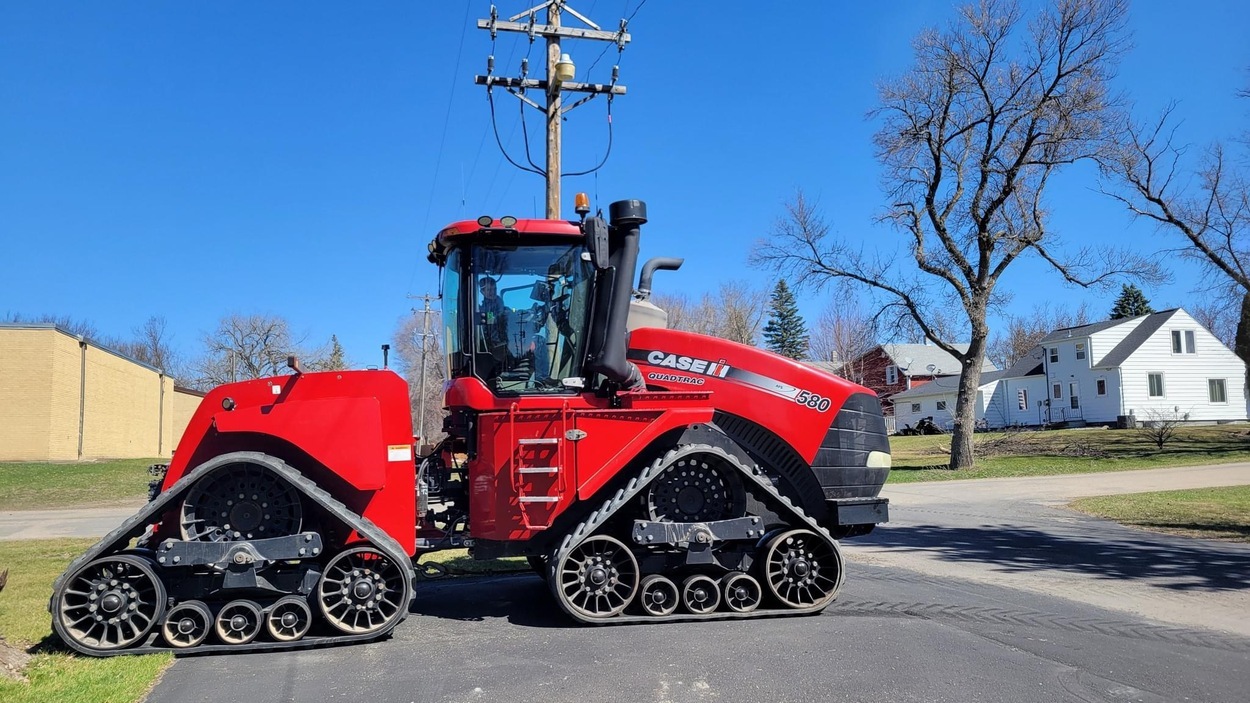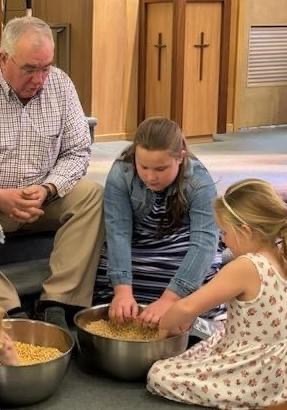
Placing hope in God: Blessing seeds at Arthur UMC

A tractor in front of the church for Sunday worship, when seeds and equipment were blessed at Arthur UMC. Photos from Arthur UMC's Facebook page.
As farmers of the land that God entrusts to our care, the United Methodist Church in Arthur, North Dakota, annually blesses the things that help feed God's people in the world.
"I invited anybody to bring seeds, pictures of their property, farms, or tractors. They could bring the keys from their tractor. Someone brought little model tractors. We put them all up at the front. They reminded us when we were doing our blessing and talking about these tools that we use that are provided to us, it allows us to create food for others," said Rev. Vernonia Fleming, Arthur UMC.
A tradition each spring at Arthur UMC is to bless the seeds, the tractors, and the people who plant the seeds that help feed the world.
"Arthur is an agricultural center. There are several grain companies and ag-related businesses in the community. There are ten or more businesses to which members in our congregation are connected," said Rev. Fleming. "We just make a point every spring of thanks for God's creation. We think about hope that goes into the ground in the spring and ask God for blessings."
In past years, celebrations have included worship at a farm, on the lawn in front of the church, and a tractor parade through town. Last year, the leader of Growing Hope Globally spoke at worship. Growing Hope Globally is an organization that links rural communities in the U.S. with the capability and desire of smallholder farmers in developing countries to grow lasting solutions to hunger.
"He shared during the worship message that seeds from this area are feeding the world," said Pastor Veronica. "It was neat to have that connection and share that we can make a difference in this world."
This year's celebration was a hybrid of hands-on seeds, tractors, and a scripture message connecting members of the congregation to their neighbors across the world. Pastor Veronica's scripture message was based on the parable of the seeds.
"We talked about how the seeds will fall in different places. By blessing the seeds, you are cultivating those seeds, like making sure that the ground is good for those seeds just like our faith. We are farmers of the land that God has entrusted to us. We are also farmers of the people, the land, and the community," explained Pastor Veronica. "When this community was formed, there was a lot of hope. It was surrounded and founded by farming. We must be farmers in the field and the church. We need to plant those seeds in people, those physical and spiritual seeds. Our job is to help sow those seeds that last for generations."

Children explore seeds at Arthur UMC.
The children's message was led by a farmer who brought in a big silver bowl filled with different kinds of seeds, such as soybeans and corn. He talked about how one seed grows and helps feed others in the community and worldwide.
As people left worship, they could pick up a pack of seeds. Pastor Veronica had purchased packs of seeds from the local greenhouse.
"I selected root vegetables, potatoes, buttercup squash—a local favorite- onion, and beets. Families could pick out what they wanted to plant," shared Pastor Veronica. "Most of the people live on a farm. The plan is to take the seed home and plant a few rows. In August, we ask people to return their produce and will give it to the food pantry."
That Sunday, people could explore a tractor parked in front of the church. The newer equipment reminded people of the bounty that many in the United States experience, while others in our country and worldwide lack seeds, equipment, soil, health, and wealth.
The liturgy for the blessing is shaped around the Beatitudes. Prays are said for safety in the fields, for the equipment, for the unknown, and hopefulness.
"Farming is just so much about faith about where those seeds land. You can't control the rest. I charge them with being farmers in the church and the community," Pastor Veronica said. "We prayerfully bless our efforts and give it to God. It is a good time and brings so much hope. So much out of our control. You must lean on your faith and hope and just let go."